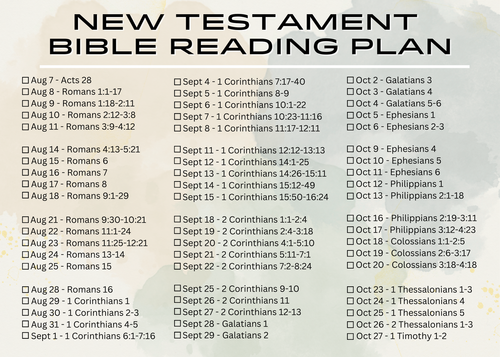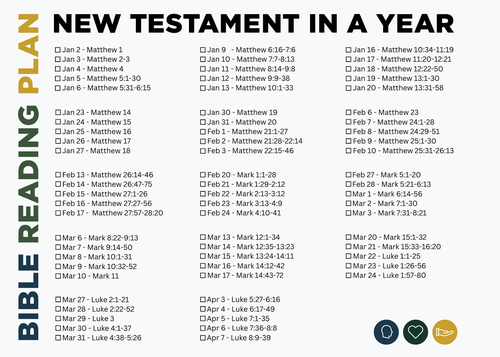Not A God Of Confusion And First Importance
1 Corinthians 14:26-15:11
When the Corinthian church gathers, there is a risk of disorderly meetings if individuals come with their own agenda for participation in worship. This can hinder the edification of believers.
Among the activities listed by Paul, all contribute to the building up of the church, except for speaking in tongues. Therefore, Paul applies his general principle for church meetings - "Let all things be done for building up" - even speaking in tongues.
Paul provides guidelines for speaking in tongues:
Only two or three prophets speak to maintain order and clarity, and the church should carefully evaluate their words. If someone receives a revelation while another is prophesying, the speaker should pause to avoid confusion. The goal is for prophecy to be conducted in an orderly manner, allowing everyone to learn and be encouraged. God is a God of peace, not chaos; His spiritual gifts should reflect this.
Paul further specifies that women should not audibly evaluate prophecies during church meetings. This practice is consistent across all the churches. Instead, women should privately seek guidance from their husbands regarding prophecies. Paul's reasoning for this command is that it is a matter of submission. It is considered inappropriate for women to evaluate prophecies openly during church gatherings.
Paul expects that there may be some Corinthians who will question his instructions. However, it is important to note that his teachings are not exclusive to the Corinthians alone. God's Word is not limited to one group of people.
Here are two warnings to consider:
Paul emphasizes the value of prophecy over speaking in tongues for the Corinthians. However, he does not intend to forbid others from speaking in tongues. Speaking in tongues is not inherently wrong, but it is not as edifying as prophecy when it comes to church gatherings. The Corinthians should use their spiritual gifts in church meetings respectfully and orderly.
The phrase "Of first importance" suggests that while everything in the Bible holds significance, not all aspects are equally important. Certain doctrines carry more weight than others, with the gospel being the utmost priority. The gospel was proclaimed, accepted, and embraced. If one fails to persevere, then their belief is rendered meaningless. Jesus died "for our sins," meaning on our behalf and in our place. His sacrificial and substitutionary death aligns with the entirety of the Old Testament rather than just a specific passage. Jesus' burial serves as evidence of his death. As predicted, Jesus "was raised on the third day." Paul provides proof of Jesus' resurrection by citing six individuals or groups to whom Jesus appeared:
Among the activities listed by Paul, all contribute to the building up of the church, except for speaking in tongues. Therefore, Paul applies his general principle for church meetings - "Let all things be done for building up" - even speaking in tongues.
Paul provides guidelines for speaking in tongues:
- Only two or at most three individuals should speak in tongues during a church meeting.
- Each person speaking in tongues should take turns.
- There must be an interpreter present, either the person speaking in tongues themselves (verse 13) or someone else with the gift of interpreting tongues. If there is no one with that gift present, then no one should speak in tongues during the church meeting.
Only two or three prophets speak to maintain order and clarity, and the church should carefully evaluate their words. If someone receives a revelation while another is prophesying, the speaker should pause to avoid confusion. The goal is for prophecy to be conducted in an orderly manner, allowing everyone to learn and be encouraged. God is a God of peace, not chaos; His spiritual gifts should reflect this.
Paul further specifies that women should not audibly evaluate prophecies during church meetings. This practice is consistent across all the churches. Instead, women should privately seek guidance from their husbands regarding prophecies. Paul's reasoning for this command is that it is a matter of submission. It is considered inappropriate for women to evaluate prophecies openly during church gatherings.
Paul expects that there may be some Corinthians who will question his instructions. However, it is important to note that his teachings are not exclusive to the Corinthians alone. God's Word is not limited to one group of people.
Here are two warnings to consider:
- If someone considers themselves a prophet or "spiritual," they should not disregard Paul's teachings regarding spiritual gifts. What Paul writes carries the authority of the Lord.
- If someone refuses to recognize the divine authority of Paul's writings, God will not recognize that person.
Paul emphasizes the value of prophecy over speaking in tongues for the Corinthians. However, he does not intend to forbid others from speaking in tongues. Speaking in tongues is not inherently wrong, but it is not as edifying as prophecy when it comes to church gatherings. The Corinthians should use their spiritual gifts in church meetings respectfully and orderly.
The phrase "Of first importance" suggests that while everything in the Bible holds significance, not all aspects are equally important. Certain doctrines carry more weight than others, with the gospel being the utmost priority. The gospel was proclaimed, accepted, and embraced. If one fails to persevere, then their belief is rendered meaningless. Jesus died "for our sins," meaning on our behalf and in our place. His sacrificial and substitutionary death aligns with the entirety of the Old Testament rather than just a specific passage. Jesus' burial serves as evidence of his death. As predicted, Jesus "was raised on the third day." Paul provides proof of Jesus' resurrection by citing six individuals or groups to whom Jesus appeared:
- Cephas, also known as Peter (Luke 24:34).
- The Twelve (Luke 24:36–43; John 20:19–23).
- More than five hundred brothers.
- James, presumably Jesus' brother who served as a pastor in Jerusalem.
- All the apostles.
- Paul himself encountered Jesus on the road to Damascus. Paul compares his calling to that of an unexpected and abnormal birth.





Recent
Archive
2023
January
Happy New Year!He Will Save His People From Their SinsMy Beloved SonTemptation And MinistryThe SermonLeaving, Lying, Limits, Love, Largesse, and The Lord's PrayerTreasure, Anxiety, and JudgmentAstonishing AuthorityStorms, Demons, and HealingJesus Is CompassionateHis Eye Is On The SparrowSwords, Rewards, and MessengersThe Lord of the SabbathBlasphemy, Bad Trees, Signs, and FamilyStories, Sowers, and SoilsParables, Hidden Treasure, and RejectionFame, Food, Fear, Faith, and FringeReal Issues And The Power Of GodDying To Find LifeLike The SunChildren, Temptation, Sheep, And ForgivenessMarriage, Kids, And MoneyTo Serve And Give His Life
February
The ArrivalStories That StingQuestion TrapsHidden Motives And LamentThe End...?UnexpectedReady?Punishment, The Plot, And PerfumeTreachery, Passover, and The CupBetrayal, Injustice, And DenialThe Field Of Blood And The GovernorCrucifixion And DeathAll AuthorityMark—The Beginning Of The GospelHealing, Preaching, And The Forgiveness Of SinEating With Tax Collectors, Fasting, The Sabbath, And An Escape BoatThe Twelve, Blasphemy, Family, And A ParableParables And PowerA Different Kind Of StormPower Had Gone Out
March
Death, Hunger, And MiraclesCommandment Or TraditionDo You Not Yet Understand?The Christ And A Glimpse Of His GloryUnbelief, Confusion, And SinDivorce, Children, And PossessionsTo Give His Life As A RansomHosannaThe Rejected Stone, Taxes, And The Great CommandmentDestruction And The EndNo One Knows, An Anointing, And A Promise To BetrayPassover And GethsemaneThe Kiss, Arrest, And DenialPilate, Simon, And The CrucifixionDeath, Burial, Resurrection, And What\'s NextTheophilus And A Visit From GabrielMary And The MagnificatBenedictusThe Arrival And The ShepherdsSimeon, Anna, And The SpiritFruits Keeping With Repentance And BaptismThe Wilderness, Nazareth, And CapernaumSimon's Mother-In-Law, Fishing, A Leper, And Sins
April
Tax Collectors, Fasting, Sabbath Controversies, And The TwelveWhy Do You Call Me Lord, Lord?Jesus Marveled, A Raised Son, And QuestionsA Sinful Woman And A ParableObeying The Word, A Storm, And DemonsTwelve Years, Twelve Apostles, And SpeculationGreater, Costly, And GloryNot Getting It, The Cost, And AppointedWoes, Neighbors, And What Is NecessaryHelp Us Pray And A Divided Kingdom?Signs, Lights, And WoesHypocrisy, Fear, A Fool, And AnxietyParables, Division, And The TimesWarnings, A Daughter Of Abraham, And Jerusalem, JerusalemA Son Or An Ox, Parties, And DiscipleshipLost ThingsThe Dishonest Manager, The Law, And Anguish In This FlameMillstones And Mustard SeedsPersistent Prayer, Humility, A Childlike Faith, And The Rich RulerEverything That Is Written, A Blind Beggar, And A Wee Little Man
May
A Parable, A Colt, A Prophecy, And A CleansingAuthority, Wicked Tenants, And TaxesThings To Beware Of And WidowsDestruction, Persecution, The Son Of Man, And WatchingThe Plot, Betrayal, Lord's Supper, And Inappropriate BehaviorPrediction, Fulfillment, Agony, Betrayal, And DenialMistreated, Taken Before The Council, Pilate, Herod, And Delivered To Be CrucifiedCrucifixion, Death, And BurialHe Is Not HereDisbelieved For JoyIn The Beginning…The Lamb Of God And A WeddingZeal, What's Inside, And Born AgainHe Must Increase
Categories
no categories
Tags
no tags
